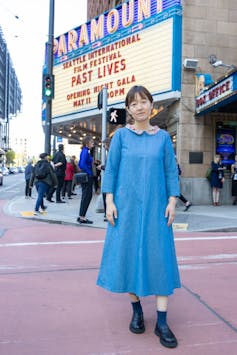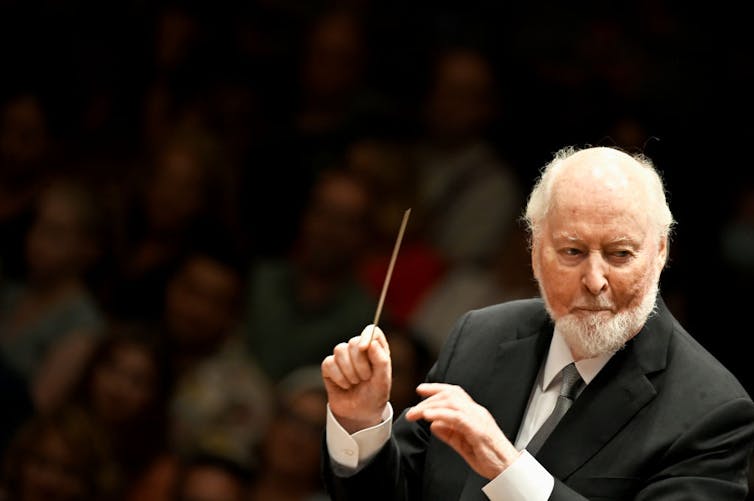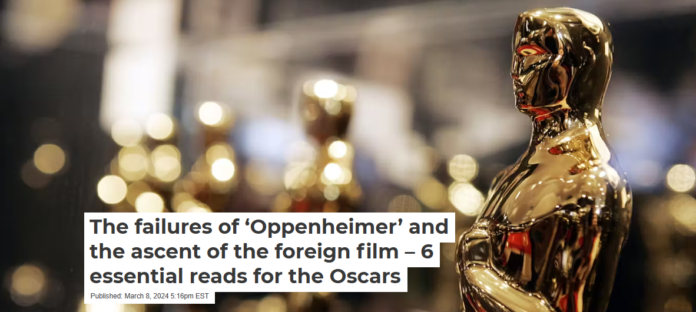
Because movies are so subjective, with views on the same performances and direction veering wildly from one critic to the next, determining the best of anything – whether it’s acting, direction or sound design – can be fraught.
But that controversy also makes for good drama and suspense – fitting for a ceremony celebrating the ways in which actors, directors and cinematographers captivate, move and thrill audiences.
So before you tune into Hollywood’s biggest night of the year, here are five recent stories – and one betting tip – about the films, fashion and actors who will be featured at this year’s show.
1. Can you want an Oscar too much?
As Michael Schulman, author of “Oscar Wars,” has written, the Academy Awards are not exactly a “barometer of artistic merit or worth.”
For that reason, in the months leading up to the Oscars, there’s a lot of behind-the-scenes politicking as studios and producers make the case for why their writers, directors, cinematographers, costume designers and actors should win the top prize.
Sometimes the actors will make the case themselves. In recent years, more and more will promote the extent to which they prepared for their roles.
You may have heard that Cillian Murphy lost 20 pounds and took up smoking (fake) cigarettes to play nuclear physicist J. Robert Oppenheimer, or that Bradley Cooper spent six years training in the art of conducting in order to film a key scene as Leonard Bernstein in “Maestro.”
The anecdotes are supposed to burnish their Oscar credentials.
“Yes, the media loves these kinds of stories, and they can demonstrate a certain type of commitment,” writes Holy Cross theater professor Scott Malia. “But they can also paint actors as pampered and pretentious ‘artistes’ whose process is self-indulgent. A working actor struggling to pay the bills doesn’t have the luxury of, say, insisting that everyone address them by their character’s name.”
2. The anti-‘Oppenheimer’ crowd
Christopher Nolan’s “Oppenheimer” is the runaway favorite to be named best picture, according to Vegas Insider.
But if The Conversation’s coverage of the film is any indication, it doesn’t deserve the win.
Charles Thorpe – a sociologist at the University of California, San Diego – explores why J. Robert Oppenheimer, in particular, has become the focus of so much writing on the bomb.
On the one hand, it’s a lot easier to digest the complexities of science, politics and human suffering through an individual – “a human-scaled way to talk about an otherwise overwhelming topic,” as Thorpe puts it.
But on the other hand, Thorpe argues that American culture’s “fascination with the man behind the bomb often seems to eclipse the horrific reality of nuclear weapons themselves.”
3. Few new insights
Michigan State University historian Naoko Wake also takes issue with what she calls the “inward-looking” nature of “Oppenheimer.”
Like so many other films about the bomb, Nolan applies a distinctly Western lens that, in Wake’s view, has become cloudy and cracked from overuse.
In the end, the film’s tension hinges on decisions made by Americans, for Americans, offering “few, if any, new insights about the bombings of Hiroshima and Nagasaki and their repercussions.”
“Even if this film is seen purely through the lens of entertainment,” Wake adds, “Nolan could have chosen to recognize why the bombs are such a galvanizing subject to begin with: They have done much, much more than make white, middle-class Americans feel anxious or guilty.”
“Their blasts reverberated across the globe,” she continues, “tearing apart not only America’s wartime enemies but also colonized peoples and racial minorities.”
4. Foreign films take center stage
But for all the concern about American perspectives dominating interpretations of history, there’s been a striking shift in the film industry, which has taken a decidedly international turn over the past decade.
This year, three non-English language films – “Anatomy of a Fall,” “Past Lives” and “The Zone of Interest” – have been nominated for best picture.

Miami University film studies scholar Kerry Hegarty tells the story of how non-English cinema has been gradually folded in the ceremonies – boxed out at first, eventually given its own category and finally winning best picture in 2020, when “Parasite” won.
Hegarty explains how this didn’t happen naturally; it took work. State-sponsored programs supporting filmmakers in foreign countries played a big role, as did changes in the demographic makeup of the Academy of Motion Picture Arts and Sciences.
“Streaming distribution has also democratized access to non-English language cinema,” she adds, “which was previously limited only to niche audiences in art house theaters in large cities.”
5. The guardians of glamour
In the early years of the Academy Awards, what people wore to the event received little attention. In fact, even after televisions landed in millions of living rooms across the U.S., movie fans couldn’t watch the Oscars on TV: The film industry resisted broadcasting the event on the medium it saw as its top competition.
That all changed once Hollywood ran into some financial trouble in the late 1940s and needed television networks to help pay for the annual event. All of a sudden, how movie stars appeared at the event mattered – and studios decided that this eccentric coterie needed some corralling.
Enter Edith Head, guardian of glamour.
University of Southern California fashion scholar Elizabeth Castaldo Lundén tells the story of how Head – and, later, Fred Hayman – maintained boundaries of decorum, while also encouraging stars to showcase the latest luxury trends and attire, turning the event into a dazzling fashion spectacle.
6. 92 years old, 54 nominations
When 92-year-old composer John Williams strolls up to Hollywood’s Dolby Theatre, he’ll be looking to secure his sixth gold statuette.
It’s been a while since Williams’ last win – exactly 30 years, when he won best original score for “Schindler’s List” in 1994. Nonetheless, Williams holds the record for most nominations for a living person, with 54.

Rice University music professor Arthur Gottschalk looks back on Williams’ illustrious career and explains how the composer’s suite for “E.T.” burnished his reputation.
Not only was it Williams’ first score to be embraced by concert orchestras, but it also changed the way director Steven Spielberg edited the film, “inverting the normal relationship between director and composer,” Gottschalk writes.
“The scoring of the finale,” he continues, “in which protagonist Elliott and his friends help the alien escape captivity, is so effective that Spielberg re-cut the end of the film to match Williams’ music.”
This story is a roundup of articles from The Conversation’s archives.
Nick Lehr, Arts + Culture Editor, The Conversation
This article is republished from The Conversation under a Creative Commons license. Read the original article.




















